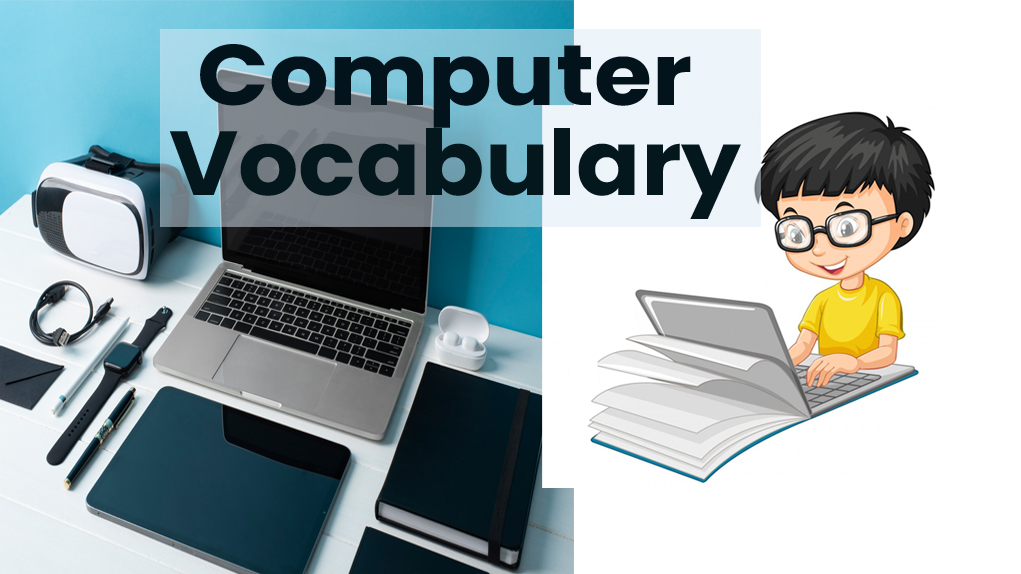Computer Vocabulary
COMPUTER – An electronic device for storing and processing data.
I use my computer to browse the internet and write documents.
KEYBOARD – A device with keys used to input data into a computer.
The keyboard has different keys for typing letters and numbers.
MOUSE – A hand-held input device used to control a computer’s cursor.
Move the mouse to click on icons on the screen.
MONITOR – A screen used to display the output from a computer.
The monitor shows the content of your computer’s desktop.
PROCESSOR – The component of a computer that performs calculations and executes instructions.
The processor handles all the tasks and operations of the computer.
RAM (RANDOM ACCESS MEMORY) – Temporary memory used by the computer to run programs.
My computer needs more RAM to run multiple programs smoothly.
Computer Vocabulary
HARD DRIVE – A device used to store data permanently in a computer.
Save your files on the hard drive for long-term storage.
SOFTWARE – Programs and applications used to perform tasks on a computer.
I installed new software to edit photos on my computer.
HARDWARE – The physical components of a computer, such as the monitor, keyboard, and CPU.
The hardware of a computer includes the physical parts like the CPU and keyboard.
OPERATING SYSTEM – The software that supports a computer’s basic functions.
Windows is the operating system I use on my laptop.
USB (UNIVERSAL SERIAL BUS) – A standard for connecting devices like flash drives and keyboards to a computer.
Plug the flash drive into the USB port to transfer files.
Computer Vocabulary
WI-FI – (WIFI stands for Wireless Fidelity) A technology that allows devices to connect to the internet wirelessly
You need to connect to Wi-Fi to access the internet.
Computer Vocabulary
INTERNET – A global network that connects millions of computers for sharing information
Use the Internet to search for information or watch videos online.
BROWSER – A software application used to access and view websites on the internet.
I use Google Chrome as my browser to surf the web.
WEBSITE – A collection of web pages accessible via the internet.
I visited a website to buy a new phone.
Computer Vocabulary
DOWNLOAD – To transfer data or files from the internet to your computer.
I need to download the latest version of the app.
Upload – To transfer data from your computer to the internet or a server.
I will upload my video to YouTube tomorrow.
FILE – A collection of data or information stored on a computer.
Save your file in a folder for easy access later.
FOLDER – A container for storing files on a computer.
Organize your documents into separate folders for clarity.
CLOUD – A network of servers used for storing data online You can save.
your files to the cloud for easy access from any device.
Computer Vocabulary
LINK – A clickable connection to another web page or document.
Click the link to open the article on your browser.
SECURITY – Measures to protect computers and networks from threats.
Always use a strong password for better security.
ANTIVIRUS – Software used to detect and remove malware and viruses from a computer.
Install antivirus software to protect your computer from harmful files.
SPAM – Unwanted or unsolicited email, often from unknown sources.
I received a lot of spam emails offering free services.
Computer Vocabulary
APP – A software application, usually a mobile app, designed for specific tasks.
I downloaded a new app to manage my daily tasks.
EMAIL – A method of sending messages over the internet.
Send me an email if you have any questions about the project.
SERVER – A computer or system that provides data or services to other computers.
The website is down because the server is not responding.
Computer Vocabulary
NETWORK – A group of computers connected to share resources and data.
I am connected to the office network through a secure VPN.
PASSWORD – A secret word or phrase used to authenticate identity and protect access.
Always create a strong password to secure your accounts.
ENCRYPTION – The process of converting data into a code to prevent unauthorized access.
The bank uses encryption to protect your financial information.
CACHE – A temporary storage area for frequently accessed data.
Clear the cache of your browser to improve its speed.
BUG – An error or flaw in a program or system.
The program crashed because of a bug in the code.
Computer Vocabulary
UPDATE – To install the latest version of software or system improvements.
Don’t forget to update your apps regularly for security fixes.
VIRUS – A malicious program that can harm or disrupt a computer system.
A virus can corrupt files and slow down your computer.
INTERFACE – The point where a user interacts with a computer or software.
The new software interface is more user-friendly.
BACKUP – A copy of data stored separately for recovery in case of loss.
Make a backup of important files before updating your system.
BLUETOOTH – A technology used for short-range wireless communication between devices.
Use Bluetooth to connect your phone to the speaker.
ACHE – A storage location used to store temporary files for faster access
Clearing your browser cache can improve its performance.
Computer Vocabulary
BROWSER HISTORY – A record of websites you have visited stored by your browser
Clear your browser history for privacy and security.
SESSION – A period of time during which a user interacts with a computer or software.
Your session will expire if you are inactive for too long
Read also: Day 15: Swimming pool vocabulary
Read also: 200 Idioms in English
Read also: Classroom phrases
For regular English-Speaking Course updates, kindly join our Telegram channel
Follow the Sarsa Education channel on Telegram: https://shorturl.at/R5WKa

